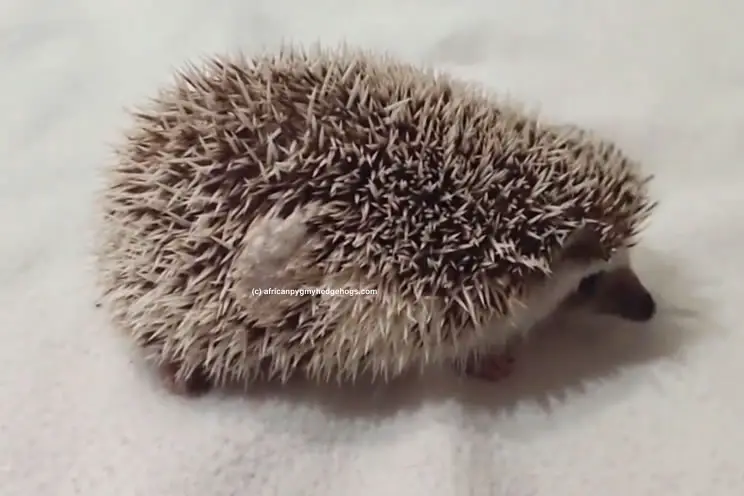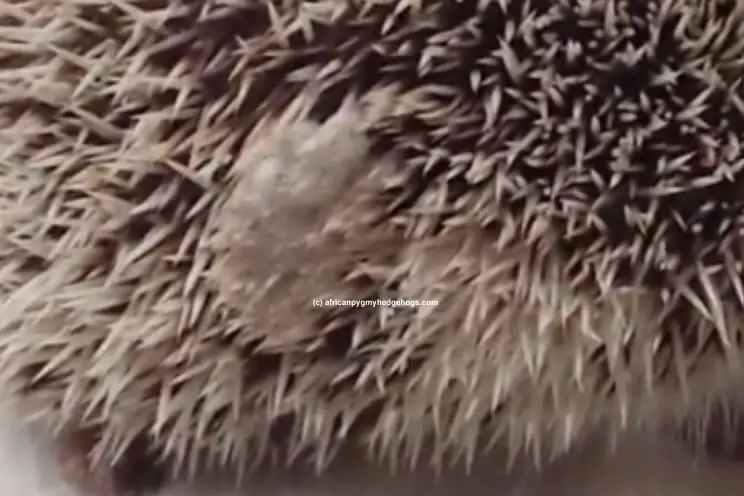Hedgehog anointing remains a mystery even as research continues unfolding the reasons behind this unique and unpredictable behavior. If you own a hedgehog, you may see it going about its business only to suddenly pause, sit in an awkward position, foam at the mouth then spread this foam onto its back. Whether your hedgehog anoints itself in response to environmental stimuli or not, we understand it is a matter of concern that requires attention.
So, what does hedgehog anointing mean? Hedgehogs anoint in response to stimuli in their environment. This includes anointing as a self-defense mechanism, especially in the wild when they sense their predator. If you have a hedgehog in captivity, their anointing could be in response to the fragrance you are wearing. Other reasons that explain anointing in hedgehogs include response to a new scent or sexual behavior.
If you want to know what hedgehog anointing means, this is the ultimate guide for you. We will help you understand why hedgehogs spit on their quills and why they anoint. Read through this guide to find out all the answers you need.
Why Do Hedgehogs Spit On Their Quills?
Hedgehogs are one of the animal species which spit on themselves in response to environmental stimuli. This behavior, also called anointing, entails the hedgehog covering its quills with strongly scented substances, mostly secretions of other animals or plants on their bodies. Your pet will chew its predator or the substances in their environment then spit on its quills.

Hedgehogs spit on their quills in response to new scents or strong smelling substances such as tobacco, fecal matter, fragrances, or toad skin. Your pet will chew and lick these substances and produce a frothy mixture that it spits on its spines. It will also do this to mask its scent, especially in a new environment and added protection.
The hedgehog’s sight is poor as they can only see an outline of things rather than details. They also see things in brown and cream shades. However, these creatures have a strong sense of taste, hearing, and smell. This explains why as a hedgehog owner if you wash your hand with strongly scented soap, your pet will anoint its quill.
Strongly scented foods such as garlic may also make hedgehogs spit on their quills. If your pet smells or tastes something new in their habitat, they will also spit on their quills. This will happen whether or not the scent is strong. Your pet may first lick at the substance with the new smell before they can anoint themselves, but they may also anoint themselves without licking first.
In the wild, hedgehogs have predators, such as owls, which are not intimidated by their spikes. Thus, to counter these predators, these creatures will spit on their quills with toxins from poisonous frogs as an additional defense mechanism. Therefore, when a predator attacks these hedgehogs, they will not only be jabbed but also poisoned. This behavior is especially noted in the African pygmy hedgehogs and explains their survival in the wild.
While all hedgehogs can spit, this behavior is more common in males than females. The behavior is also common in the young hedgehogs as they try to familiarize themselves with their environment. Thus, while it may seem scary to watch your pet spit on its quill for the first time, this behavior is normal. This behavior is also seasonal, with the peak usually in July. However, there is no specific pattern, thus difficult to state with finality the main reason behind this behavior.

Also, this behavior can catch you off guard, making it look weird to you. Usually, a hedgehog will give a little warning, if any, that they are about to spit on their quill. They may be moving in the cage, or you may be petting them, and suddenly they crank their neck and start spitting on their quill.
To ensure that the foam spreads to all their spines, they will twist their body in all positions. This explains why the behavior can be interpreted as seizure or rabies. Your pet will get absorbed in the moment and may appear tired afterward, making it vulnerable, but this should not worry you, given that these creatures are well equipped to survive in their environment.
Why Do Hedgehogs Anoint?
Little research and findings are available to explain why hedgehogs anoint, probably because it is nothing to worry you. However, understanding the probable reasons why your pet is anointing itself is important to ease your anxiety. Also, by knowing why hedgehogs anoint, you will distinguish this behavior from suspected illnesses.
Hedgehogs anoint themselves due to changes in the odors and scents within their environment. When these creatures encounter new scents in their environment, they will react by licking or chewing the source of the smell, froth, and then use the lather on their body to defend themselves. When you take a hedgehog for the first time in your home, you will most likely notice this behavior as it tries to familiarize itself with the new environment.
Given that there is little research on this behavior, no one is certain why hedgehogs exhibit this behavior. Thus to explain it, certain theories have been put across by researchers. These theories explain why hedgehogs anoint, including poisoning their prey or predator, as a sexual response and camouflaging themselves.
Hedgehogs prey on a variety of creatures, including insects and toads. To capture fleas and other parasites for food, hedgehogs spread their saliva on their spine. This saliva is toxic to these parasites, and once they land on the hedgehog, they will die, making it easy for the hedgehog to eat them.
To survive in the wild, hedgehogs rely on scent camouflage. Just like dogs roll over a dead animal to mask their scent, these creatures anoint to hide from their predators by masking their scent. They will do this by adapting a scent that closely matches something in their environment, making it difficult for their predator to distinguish them.
This technique is instrumental in the wild where they are surrounded by predators; hence, a useful survival strategy. In this case, the males will anoint more than females, given that they range over a wide scope compared to females. Also, this is useful to the younger hedgehogs during their vulnerable stage of growth.
Hedgehogs also anoint themselves by coating their spines as a protective mechanism. These creatures are generally resistant to poisons and can survive snake bites and eat a toad’s skin. Given that they safely eat the giant toad, it is believed that the wild hedgehog’s saliva may contain toxins. Thus, spreading this saliva on their spines offers protection against predators.
Hedgehogs may also chew on a poisonous substance once they see their predator to produce toxic saliva. They will then smear this saliva on their spines such that when their predator approaches, they will jab them with these poisonous spines, which irritate more than the clean spines.
In captivity, hedgehogs will continue to anoint, given that this is an ingrained behavior. This, they will do to feel safe and stay healthy even though it is not serving them as in the wild. If you spot your pet anointing itself, do not attempt to stop it, irrespective of how gross the behavior appears to you.
This is because interrupting your pet may cause anxiety, affecting their health and lifespan in the long run. Instead, give your pet time and monitor it from a distance or using cage cameras to rule out illness or other suspicions you may have.
Finally, hedgehogs anoint as a way of communication. In hedgehogs of the opposite gender, this behavior could signal sexual attraction, with one of the members asking the other to mate with them. It could also signal a relationship between the hedgehogs or just a way of intimidating each other.
Wrap Up
Hedgehogs are interesting pets, and their anointing behavior stands out as their distinguishing feature. This behavior is most common in young and male hedgehogs. Hedgehogs have a strong sense of smell and can easily smell their predator from a distance. They are also resistant to most toxins in the wild, contributing to their survival in the wild.
To survive in the wild, hedgehogs anoint themselves once they smell their prey, something unfamiliar, or a strong scent. Given their resistance to toxins, they can chew poisonous substances in their environment and spit on their quill then counter their predator with toxic jabs. Also, anointing helps them camouflage as they chew the substances in their environment and apply them to their quills, making it difficult for their predators to sniff them.
In captivity, hedgehogs will continue with anointing, but this will be triggered by your fragrance or pungent foods such as garlic. They may also do this as an inbuilt behavior to feel safe and remain healthy.
Given the above reasons for anointing, you should not mistake this behavior as an illness. When it happens, avoid disrupting your pet, as this may make them anxious and impact negatively on their health and lifespan. By allowing your pet to anoint without interruptions, you will make them enjoy a healthy and long lifespan.


